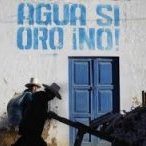English · Español

22 November 2014 | Special reports | Victims of climate change | Water | Extractive industries | Social activists at risk
Movement under construction
The resistance to the mining industry in the Latin American campesino agenda shows greater levels of coordination
Download: MP3 (3.1 Mb)
The territorial problems derived from the transnational mining exploitation are central in the agenda of conflicts and fights of Latin America, and in this regard the campesino movement develops its own experiences, making alliances and coordinating with the affected communities “in the first person”.
In an interview with Jarbas Viera from the MAM (movement of those affected by the mining industry in Brazil), an organization founded in 2012 part of Vía Campesina Brazil, he told us about the need of denouncing these problems that affect the majority of the Latin American peoples.
In the last ten years there was a significant growth in the global demand for metallic minerals; mainly iron, copper, nickel and gold. Being one of the regions with more mineral reserves than the rest of the world, this strongly affects Latin America. The mining industry is closely related to the sovereignty of the states and the communities that have been affected with the advance of the capital, the transnational corporations, and imperialism, bringing issues such as pollution of waters, lands and air.
According to MAM’s research, the campesinos and indigenous people have been affected the most, since the exploitation has been more intense in these regions and lands; hence the need for a construction of a movement in each country that addresses the issue, explained Jarbas in the interview.
The mining process did not appear today; it came along the colonization process, but it has intensified in this period after the 2008 crisis. Nearly 12 companies monopolize this sector and control the 79% of the global market, including Vale, Río Tinto, Angloamérica, Metorex, Barrick Gold, from countries like Canada, Australia, Sweden, Brazil, and England.
The mining industry in CLOC-Vía Campesina
On the other hand, Nury Martínez from the Political Coordination of CLOC-Vía Campesina South America, talks about the importance of joining the fights against mining on that coordination and highlights the role of MAM as a good experience that has introduced more knowledge into this issue.
Nury is from Colombia and a member of FENSUAGRO, and with the experience from this campesino federation of rural workers, she remarks the importance of establishing a “political fight” against the actions of transnational mining companies.
“In CLOC-Vía Campesina we believe we must give a political fight against the transnational companies and the free-trade agreements (between the countries hosting the transnational companies and those were the mineral exploitation is carried out), which are tools that made possible for the states to hand over the territories of campesino and indigenous people for mining exploitation. Most of the mining companies are in our lands; in some cases with different names, but they are the same. Many of these companies enter countries and territories with similar legal frameworks and the same modus operandi that has to do with eviction from the lands, damages to the environment, and social consequences such as prostitution, violation of human rights, and murders. In this respect, we believe in the need of creating a very broad front. Nowadays, people must be united and globalize the fights to denounce the damage caused by mining to the mother earth and the people,” Nury states.
In the organic reunion of CLOC-Vía Campesina South America, which took place in November 5-8 in Chile, the main resolutions were: that the mining issue be assumed as part of the work of the Colectivo de Tierras y Territorios; carrying out a Continental Gathering against the mining industry; and including the mining issue on the debates and agenda of the VI Conference of CLOC-Vía Campesina which will take place on April 2015 in Argentina.
There was a continental gathering of the fights against the mining industry in Guatemala scheduled for this month, organized by the Articulación de Movimientos Sociales hacia el ALBA, but it was postponed for March of the next year, also in the same Central American country.







